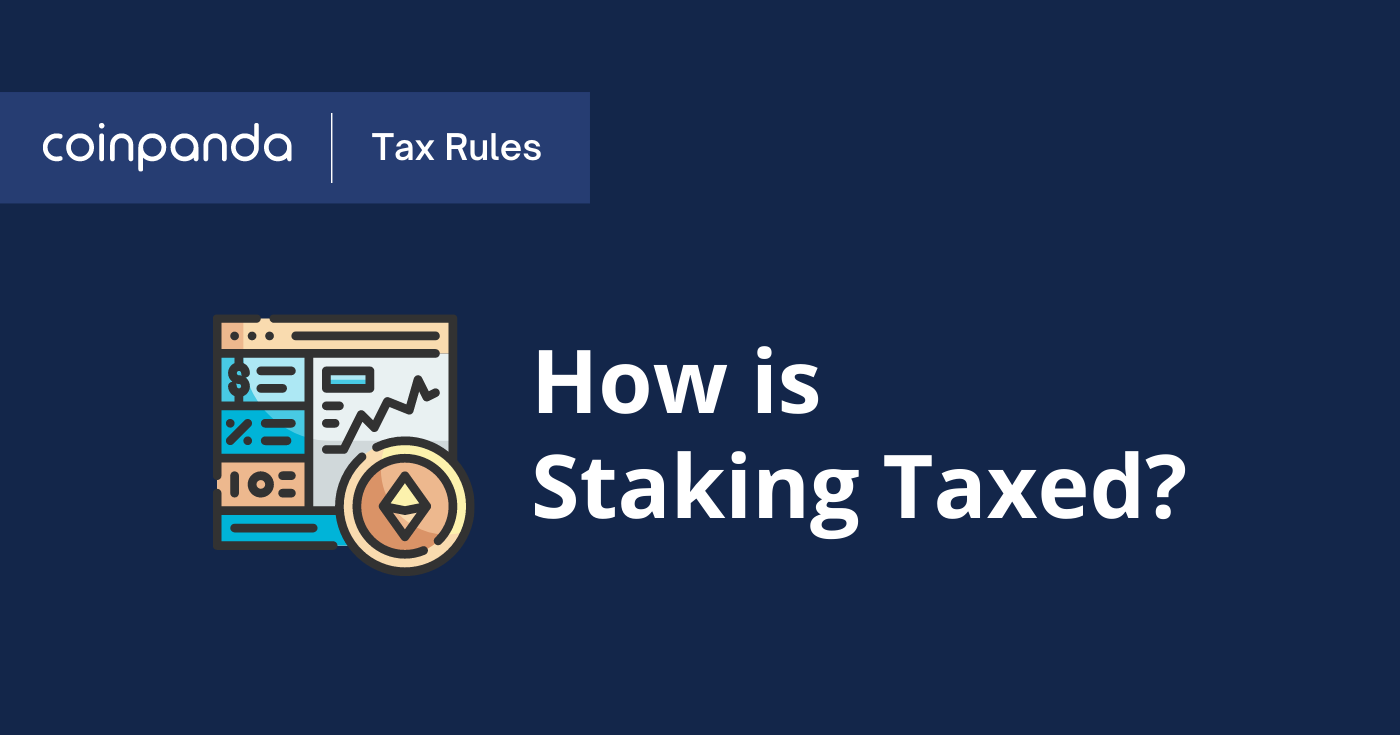Navigating the intricate world of cryptocurrency staking and its tax implications can be daunting. This article provides an insightful guide to demystifying the complexities associated with how staking rewards are taxed. Read on to better understand how your cryptocurrency staking activities might be taxed and how to report staking in your tax return.
Key takeaways
- Cryptocurrency staking offers rewards typically treated as taxable income in many jurisdictions, similar to interest payments in traditional finance.
- The exact tax implications for staking rewards vary greatly, with specifics dependent on local tax laws and regulations.
- Transferring coins to a wallet for staking is generally not taxed as long as you control the private keys.
- For staking rewards, calculating taxable income involves determining the fair market value of the tokens at the time they were received, which can influence future capital gains calculations.
What is crypto staking?
Cryptocurrency staking is a process that involves participating in a proof-of-stake (PoS) blockchain network by holding and ‘staking’ a cryptocurrency in a digital wallet to support network operations. These operations may include validating transactions, maintaining network security, and updating the blockchain. Participants often receive additional tokens as rewards in return for staking their assets.
To better understand crypto staking, it’s essential to differentiate between the two primary consensus mechanisms in the blockchain world: Proof-of-Work (PoW) and Proof-of-Stake (PoS).
Proof-of-Work (PoW)
In a PoW system, miners compete to solve complex mathematical problems with their computers. The first one to solve the challenge gets to add a new block to the blockchain and is rewarded with a specific amount of newly created coins on the blockchain. This process, known as mining, requires considerable computational power and energy. The most known PoW blockchain today is Bitcoin – the first blockchain created.
Proof-of-Stake (PoS)
On the other hand, a PoS system selects validators based on the number of cryptocurrencies they have ‘staked’ or hold as collateral. These validators are chosen to create a new block and validate transactions. The probability of being chosen is usually proportional to the amount of cryptocurrency staked; the more one stakes, the higher the chances of being selected. Unlike PoW, this process does not require massive energy consumption and is therefore seen by many as a more environmentally friendly alternative.
Cryptocurrency staking is a less energy-intensive alternative to cryptocurrency mining for creating blocks and validating transactions. It allows crypto holders to actively participate in the blockchain’s consensus mechanism and earn rewards while reducing the environmental impact at the same time.
What are staking rewards?
Staking rewards are the incentives cryptocurrency holders receive for participating in a Proof-of-Stake blockchain by staking their digital assets. When you stake your cryptocurrency, you essentially lock the coins up in the network for a certain period, and you will earn additional coins in return. These rewards can be viewed similar to interest or dividends in the traditional finance world.
How much staking rewards you receive will often depend on various factors, including the amount of cryptocurrency staked, the staking duration, and the total number of other people also staking in the same network.
What are staking pools?
Staking pools let smaller cryptocurrency holders participate in the staking process and receive rewards. In a staking pool, multiple individuals combine resources to increase their chances of being selected to validate transactions and earn staking rewards.
Similar to a mining pool in the PoW system, a staking pool allows participants to receive rewards proportionate to their amount of staked assets, making staking more accessible for those with fewer coins. These pools can improve network security and decentralization while providing participants with more consistent rewards.
The table below shows some of the most popular staking pools today.
| Staking pool | Supported blockchains |
|---|---|
| Lido | ETH, MATIC, SOL, DOT, KSM |
| Stakely | ETH, FTM, DOT, ATOM, SOL (39+ assets in total) |
| Allnodes | ETH, ADA, TRX, MATIC, SOL (72+ assets in total) |
| Kraken | ETH, ADA, ATOM, MATIC, DOT, SOL (18+ assets in total) |
| Binance | ETH, BTC, BNB, XRP, USDT (120+ assets in total) |
Crypto staking events
Two transaction types are usually involved in crypto staking:
- Transferring your coins to and from a staking contract, pool, or staking service
- Receiving staking rewards in return for locking up your coins
Transfer coins for staking
The tax treatment on moving your coins to start earning staking rewards, such as transferring your coins to a staking contract, pool, or a centralized staking service, is not entirely clear from a tax perspective and varies from country to country.
However, the general rule is that moving coins to a wallet or platform you control is not considered a taxable event. This means that transferring your coins on most centralized staking services, such as Kraken and Binance mentioned in the table above, is not taxable and will not realize capital gains on the coins transferred.
On the other hand, transferring coins to a smart contract that you don’t control the private keys of will be considered a taxable event by many tax authorities since you are not the address owner, and the transaction will therefore be considered a disposal. It’s important to emphasize again that this topic has many nuances, and the current tax rules in many countries allow for different interpretations when judging whether a transfer is a taxable event. If you are unsure if you need to calculate and report capital gains on such transfers, we highly recommend contacting the tax authorities in your country or speaking with a tax professional.
Crypto staking rewards
Staking rewards refer to any tokens or coins you receive as rewards for locking up your coins in a staking contract, pool, or centralized service. Such rewards can be paid hourly, daily, weekly, or any other interval. The number of coins you receive typically depends on the number of coins you have locked up and the total collateral locked up by all other participants in the staking network, such that the rewards you earn can vary daily.
Let’s look closer at how staking rewards are taxed.
Are staking rewards taxed?
Staking rewards are typically subject to tax in most regions worldwide. The rewards are often treated as income, with tax implications arising when receiving the coins in your wallet. However, the specific tax laws and rates can vary widely depending on the jurisdiction and by which method the coins are being staked.
Typically, you will also need to pay capital gains tax when you sell the coins in the future if the value has appreciated since the time you received the staking rewards in your wallet. On the other hand, if the coins have depreciated in value, you can usually claim the loss as a capital loss and offset this against capital gains and potentially other income.
Crypto staking taxes in USA
In the United States, cryptocurrency staking rewards are typically taxed as income. This means that the rewards are subject to income tax when received, based on the fair market value of the coins at that time. The specific tax rate would depend on the taxpayer’s tax bracket.
Although the IRS has published guidance on cryptocurrency taxes several times, the agency remains to issue clear and specific tax rules surrounding cryptocurrency staking and all the nuances associated with the different ways a person might earn staking rewards. As of the time when writing this article, the most applicable guidance from the IRS is Notice 2014-21, which directly addresses the tax implications of cryptocurrency mining:
If a taxpayer’s “mining” of virtual currency constitutes a trade or business, and the “mining” activity is not undertaken by the taxpayer as an employee, the net earnings from self-employment (generally, gross income derived from carrying on a trade or business less allowable deductions) resulting from those activities constitute self-employment income and are subject to the self-employment tax.
Notice 2014-21, the IRS
While this might sound clear, the now infamous court case in 2021, where a couple sued the IRS for having to pay income tax on staking rewards from Tezos, has initiated an ongoing debate about whether staking rewards can legally be taxed as income at the time of receipt. The IRS eventually offered to refund the American couple for the taxes they had paid on their staking income, but the agency has not yet issued any new guidance on the topic. However, until the IRS issues more precise guidance, most tax advisors agree that the safest approach is to report staking rewards as income in your tax return.
Crypto staking taxes in Canada
In Canada, cryptocurrency staking rewards are typically treated as income when the coins are received, similar to the United States. The fair market value of the rewards at the time of receipt forms the basis for calculating income tax. The tax rate will depend on the taxpayer’s income and corresponding tax bracket.
Remember that staking rewards will only be taxed as income if the Canadian Revenue Agency (CRA) considers your staking a business activity. While the rules are not clear, the CRA will typically consider staking to be a business activity if the intention is to make a profit. You will also pay capital gains tax when you sell the coins later if the coins have appreciated in value.
However, if the CRA considers your crypto staking a hobby instead of a business, the rewards will not be subject to income tax at the time of receipt. Rather, you will only pay capital gains tax when the coins are sold in the future. In this case, you need to consider a zero-cost basis since you didn’t pay anything initially to acquire the coins.
Crypto staking taxes in Australia
In Australia, cryptocurrency staking rewards are generally considered ordinary income when the coins are received. This means that staking rewards are taxed based on the Australian dollar value of the reward at the time the coins are received. The specific tax rate depends on the individual’s income bracket as per the progressive tax system in Australia.
The Australian Taxation Office (ATO) published a new guidance in 2022 that clearly addresses the topic of taxes on staking rewards:
As a forger who creates a new block, you’ll usually receive a reward in the form of additional tokens from holding the original tokens. The money value of additional tokens is ordinary income at the time you receive the tokens. You need to declare the income in your tax return as other income.
The ATO
Australian taxpayers will also need to pay capital gains tax when the coins are disposed of in the future if the coins appreciate in value since receiving the rewards.
Crypto staking taxes in Europe
Taxation of cryptocurrency staking rewards in Europe can vary as it is dependent on the specific regulations of each country within the European Union. However, staking rewards are considered income in most countries and are taxed based on the fair market value at the time of receipt. Individuals need to check the tax laws related to cryptocurrency in their specific country to understand their obligations.
How to calculate staking income
Calculating staking income typically involves determining the fair market value of the staked tokens at the time they were received. This value, often expressed in your local currency, represents your income from staking. It’s vital to record these values accurately and consistently, as they form the basis for income tax calculations and may also influence the cost basis for future capital gains calculations when you sell the assets.
Let’s look at this using a practical example. You have been staking Tezos (XTZ) on Coinbase, and now you need to calculate the daily value in your local currency of the coins received. We assume that you have received XTZ tokens on four occasions for simplicity:
| Tx No. | Date | Rewards | XTZ Price | Taxable Income |
|---|---|---|---|---|
| 1 | 2023-01-10 | 78 XTZ | $0.83 | $64.74 |
| 2 | 2023-02-15 | 92 XTZ | $1.14 | $104.88 |
| 3 | 2023-03-12 | 104 XTZ | $1.05 | $109.20 |
| 4 | 2023-04-18 | 95 XTZ | $1.16 | $110.20 |
The total taxable income in this example is simply the sum of the fair market value for all transactions:
Taxable income:
$64.74 + $104.88 + $109.20 + $110.20 = $389.02
Suppose you struggle to keep track of the USD value (or the value in your local currency) on each date you have received a staking reward. In that case, you may want to check out a crypto tax solution that automatically does all the necessary calculations for you.
Summary
Cryptocurrency staking presents an exciting opportunity for investors to grow their digital assets. However, as with all financial activities, it’s crucial to understand the tax implications that come with staking rewards. While this guide offers a broad overview, the specific taxation details can vary considerably based on individual circumstances and the jurisdiction in which one resides.
However, in most countries, including the US, Canada, and Australia, staking rewards are similar to mining rewards for tax purposes. Cryptocurrency received as staking rewards should therefore be reported as income in the tax return based on the value of the reward at the time the coins are received. When you sell, trade, or otherwise dispose of the coins later, you must calculate and report capital gains according to your country’s tax rules and cost basis method.
Finally, tax software explicitly designed for cryptocurrency transactions, like Coinpanda, can simplify this process. These platforms can automatically calculate your taxable staking income, track the cost basis for your assets, and generate ready-to-file tax reports. As cryptocurrency grows, remaining tax compliant will ensure you can focus on the exciting opportunities ahead without worrying about regulatory complications.





